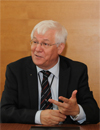 |
||
|
Russia to Overhaul Fleet of Amphibious Assault Ships – Minister RIA Novosti, PUBLISHED 07.03.2014 Russia’s fleet of amphibious assault ships requires extensive modernization because their service life has been largely overextended, Defense Minister Sergei Shoigu said Tuesday. “The Russian navy currently has 19 ships of this type. They have been in service, on average, for more than 25 years,” Shoigu said at a video conference meeting with military commanders. Russia’s Black Sea Fleet, which is largely based on the Crimean peninsula, reportedly includes seven aging assault landing ships of the Alligator and Ropucha classes. Topics: Russia Other news: Hungary Enacts Law to Expand Nuclear Power With Russian Aid Hungary’s president has signed a bill into law to expand a nuclear power plant in the country with Russian assistance. Hungary Lawmakers OK Russia Nuclear Plant Deal Russia will provide Hungary a loan of up to 10 billion euros ($13.5 billion) - around 80 percent of construction costs. Russia to Lend Hungary $13.7Bln for Nuclear Plant The deal was announced during a state visit to Moscow by Hungarian Prime Minister Viktor Orban and was hailed by Russian President Vladimir Putin. |
Hero of the day 
We are currently working with the Nuclear Decommissioning Authority (NDA) on this approach, which was submitted in response to their February 2012 call for alternative proposals. We appreciate that the UK is in the early stages of their policy development activities and are pleased to be involved in such important work. INTERVIEW
Yanko Yanev OPINION
Joint Plan of Action |

